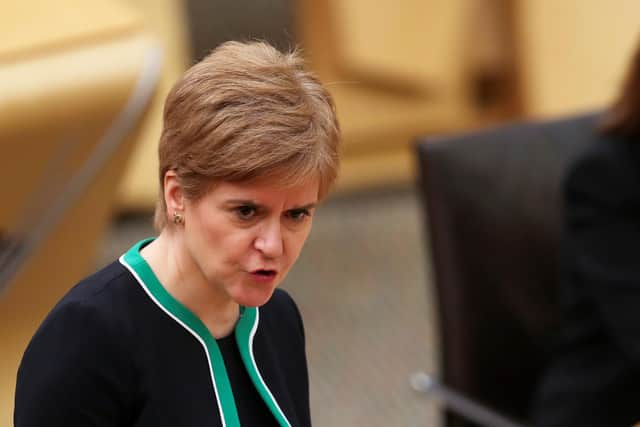Scottish voters rewarding Nicola Sturgeon's handling of pandemic as Covid-19 sends votes to SNP
The poll, by SavantaComRes for The Scotsman, puts the SNP on course for a comfortable majority at the Scottish Parliamentary elections in May, with opposition parties failing to make a dent in the overall support across the country for Ms Sturgeon’s party.
Pollsters interviewed 1,016 Scottish adults aged 16 or over online between January 8 and 13 for the survey.
Advertisement
Hide AdAdvertisement
Hide AdSupport for independence remains high, with 57 per cent of Scots saying they would vote yes if a second independence referendum was held tomorrow compared to 43 per cent who would vote No when ‘undecideds’ are excluded.
Independence is the majority view across the country even with ‘undecideds’ included, with 51 per cent saying they would vote yes, 38 per cent supporting No, and 10 per cent saying they did not know.
Indyref2 within the next two years remains supported by around 40 per cent of voters, with a majority of 52 per cent stating it should take place before the 2026 Holyrood elections.
Ms Sturgeon’s handling of the Covid-19 pandemic is also driving Scots to vote for the SNP and the leader of the nationalists is popular with many people who voted for other parties in the 2019 election.
The figures have led to warnings that Scottish Labour could be most at risk from voters jumping ship to vote for the SNP.


A net total of 22 per cent of voters – of which 37 per cent voted for Scottish Labour in 2019 and 13 per cent Scottish Conservative voters – are “more likely” to vote for the SNP due to their handling of the pandemic.
The ‘Sturgeon effect’ is further demonstrated by the poll’s data showing almost half – 46 per cent – of Scottish Labour voters and a third – 36 per cent – of Scottish Conservative voters have a better view of the First Minister now than they did before the pandemic.
In total, 59 per cent of voters have a more positive view of Ms Sturgeon now than pre-pandemic.
Advertisement
Hide AdAdvertisement
Hide AdOpposition parties are also struggling to persuade voters to switch sides. Just 19, 21 and 15 per cent of voters said they felt “more likely” to vote for the Scottish Conservatives, Scottish Labour and Scottish Liberal Democrats respectively due to how the parties have handled the pandemic.
Ahead of the 2021 Holyrood elections, overall support for the main parties has remained largely stable since the last poll in December, with the SNP set for a majority of 13 seats in Holyrood.
In the constituency vote, the SNP and the Scottish Conservatives saw small drops of support of two and one point respectively to 53 per cent and 19 per cent of the vote share.
Scottish Labour saw their vote increase by two points to 18 per cent, with the Liberal Democrats staying on 6 per cent.
However, the Scottish Conservatives have taken a hit in the list voting intention, dropping to third with just 16 per cent of the vote share, down four points from December and behind both the SNP (44 per cent, up two points) and Scottish Labour (18 per cent, up one point).
It is the lowest level of support for the Scottish Conservatives in the regional list since April 2016 and the joint lowest constituency vote share since the 2016 election.
The Scottish Greens have again had a strong showing in the list vote with 11 per cent, down one point from December, with the Liberal Democrats recording a rise of one point to eight per cent of the vote-share.
Such a result would see the SNP secure 71 seats (up eight from 2016), Scottish Labour 21 seats (down three), the Scottish Conservatives 17 (down 14), the Scottish Greens 11 seats (up five) and the Scottish Liberal Democrats nine seats (up four).
Advertisement
Hide AdAdvertisement
Hide AdChris Hopkins, associate director at SavantaComRes, said not much has changed in Scottish politics between December and January as the pandemic takes centre stage.
He said: “The state of the parties in Scotland looks much the same in January as it did in December, and perhaps that’s a reflection of the fact that while the pandemic continues to dominate the news agenda, there is little time for overt electioneering like there would usually be a few months before an election.
"There are some slightly improved numbers here for Labour, but that looks primarily down to Keir Starmer, as metrics relating to Scottish Labour and Richard Leonard have barely shifted.
“What appears most interesting here is that the ceiling for Nicola Sturgeon and the SNP could be even higher than these already-strong figures.
"Our data shows that Sturgeon’s management of the pandemic has improved her reputation among significant chunks of 2019 Labour and Conservative voters, and the SNP’s response to the crisis has led recent Labour voters to consider the SNP in May.
"Holding onto these voters will be imperative for Leonard and Scottish Labour over the coming months, as Labour, more so than the Conservatives, seem to see the SNP’s appeal.”
Concerns around Brexit have dropped since no deal was avoided on Christmas Eve by the UK Government, with Scots now listing it as only the third most important issue facing Scotland, down from second in December.
Health is now the second most important issue for Scots with 52 per cent choosing it as one of the three most important issues facing the country, with the economy top, employment fourth, education fifth, with independence sixth.
A message from the Editor:
Thank you for reading this article. We're more reliant on your support than ever as the shift in consumer habits brought about by coronavirus impacts our advertisers.
If you haven't already, please consider supporting our trusted, fact-checked journalism by taking out a digital subscription.
Comments
Want to join the conversation? Please or to comment on this article.